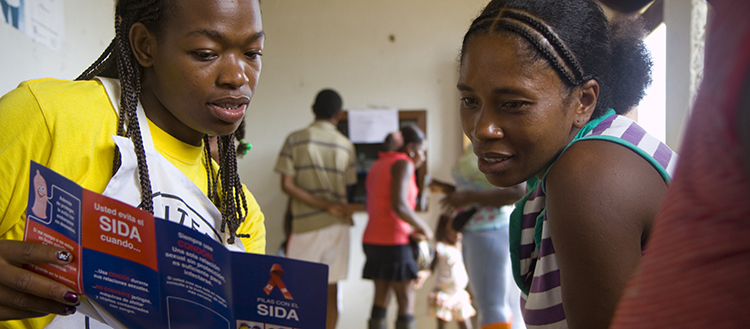War: how to protect the health of women and children?
After having conducted a study of the health situation in armed conflicts, the international consortium BRANCH, of which UNIGE is a member, calls for urgent action to improve the health of civilians, especially of women, adolescents and children.

© An ICRC nurse during a discussion on HIV/AIDS with patients. ©ICRC Christoph von Toggenburg
More than half of the world’s population of women and children live in countries affected by armed conflicts, and countries with the highest neonatal mortality rates in the world are almost all at war. In addition, the majority of the tens of millions of people forcibly displaced each year (71 million in 2019) are women and children who, in such precarious situation, are at high risk of deteriorating health and nutritional status, but also of violence – rape, mutilation or forced recruitment by armed groups notably. The BRANCH Consortium brings together an international network of academic institutions, including the University of Geneva (UNIGE) through its Centre for Humanitarian Studies, and humanitarian actors. It publishes in a special issue of The Lancet, a series of five articles aimed at better understanding the needs in terms of sexuality, reproduction and maternal and child health in situations of armed conflict in order to define short and long term response strategies. This original work also responds to the need of scientifically validated evidence to guide humanitarian action.
Armed conflicts disproportionately affect women and children. In addition, their constantly changing dynamics, the growing role of non-state armed groups and the instrumentalisation of civilian populations make health interventions increasingly difficult. “Disregard for the law, impunity in case of serious violations of the rules of armed conflict, and the growing inability of the international community to prevent and mitigate the direct and indirect effects of war call for a profound reform of humanitarian action,” says Karl Blanchet, Professor at the UNIGE Faculty of Medicine and Director of the Geneva Centre for Humanitarian Studies, and member of the BRANCH Consortium Steering Committee. “In addition, other external factors, such as climate change and urbanisation, can change both the determinants of conflicts and the parameters of humanitarian intervention.”
Multi-modal expertise for a concerted action
Using a variety of methods, a panel of experts and frontline health professionals decided to join forces to analyse the nature and dynamics of women’s and children’s health in various war contexts in order to provide both strong data and pragmatic advice to all concerned – politicians, field agencies and those promoting the respect of the law of armed conflicts. “Increasingly, humanitarian interventions need to be evaluated for efficiency, transparency and accountability,” says Karl Blanchet. Indeed, we need to define a common technical basis for intervention, while recognising the need to constantly adapt to the populations and to the permanent changes in their living or survival environment.
Ten practical examples
The team led by Professor Karl Blanchet reviewed the situation in ten countries at war: Afghanistan, Colombia, Democratic Republic of Congo, Mali, Nigeria, Pakistan, Somalia, South Sudan, Syria and Yemen. “We deliberately chose countries that are very different in terms of conflict dynamics health situation and cultural context,” he explains. “Nevertheless, some general conclusions can be drawn, such as the great disparities in access to health care within a country, or the fact that often donor priorities – and not those of the population – determine the implementation of health interventions.”
Moreover, access and quality of data remain limited in conflict situations. “The dynamic nature of modern conflicts and the growing role of non-state armed groups in large geographical areas pose new challenges. However, the humanitarian system – and first and foremost local actors who know their field of intervention well – is creative and has developed innovative solutions,” adds Professor Blanchet. “However, their effectiveness needs to be evaluated and then promoted.”
An academic centre in Geneva to strengthen humanitarian action
The Geneva Centre for Humanitarian Studies is a joint centre of UNIGE and the Graduate Institute for International and Development Studies (IHEID). Its aims to become an important stakeholder for research, analysis, reflection and training, as well as a major place for meetings and exchanges. Its new strategy is based on three main areas: training, humanitarian dialogue and integrated evidence-based research, as shown by the work conducted within the BRANCH Consortium.
